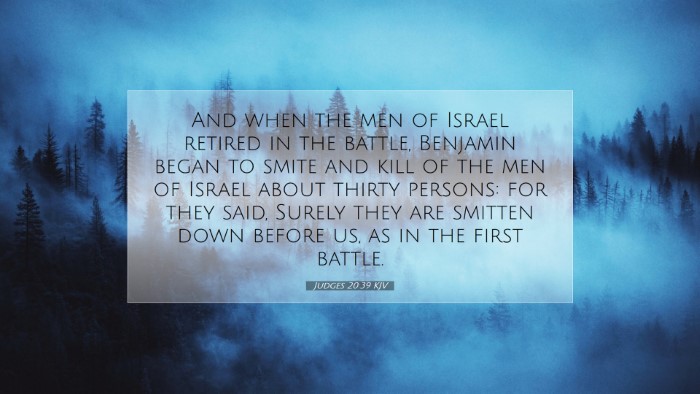Commentary on Judges 20:39
Verse (Judges 20:39): "And when the men of Israel retired in the battle, Benjamin began to smite and kill of the men of Israel about thirty persons: for they said, Surely they are smitten down before us, as in the first battle."
Introduction
This passage emerges from a complex narrative within the Book of Judges, showcasing the turmoil and conflict that marked Israel's history during the time of the judges. The war between the tribes of Israel and the tribe of Benjamin reflects larger themes of tribal loyalty, sin, divine judgment, and national identity.
Contextual Overview
Before delving into the verse, it is essential to understand its setting. The narrative in Judges 20 recounts the aftermath of a grievous crime in Gibeah, where a Levite’s concubine was brutally abused and killed. The resulting outrage leads the other tribes to rally against Benjamin, calling for justice and retribution.
- Historical Background: The chapter illustrates a significant civil war that not only divided Israel but threatened the annihilation of one of the tribes.
- Theological Implications: The conflict raises questions about justice, obedience to God, and the consequences of sin.
Verse Analysis
“And when the men of Israel retired in the battle...”
This phrase indicates a strategic maneuver in battle. The Israelites feigned retreat, which plays a critical role in the ensuing dynamics and tactics employed during this conflict. The retreat symbolizes both a physical withdrawal and a psychological ploy to incite reactions from the Benjamites.
“Benjamin began to smite and kill of the men of Israel about thirty persons...”
From a theological perspective, the numbers here are significant. The slaughter of thirty Israelite warriors by Benjamin suggests both the ferocity and desperation of the Benjamite warriors, as well as the devastation wrought upon the nation of Israel.
The Significance of Number Thirty
According to Albert Barnes, the number thirty may also hold symbolic value. In biblical tradition, certain numbers carry prophetic or theological meaning. Thirty often relates to a period of mourning or judgment.
Theological Themes
- Divine Judgment: The violence stemming from the tribe of Benjamin can be seen as a manifestation of divine judgment—or lack thereof—as they participate in the defense of their sin, resisting the call to repentance.
- The Cycle of Sin: This passage highlights the recurring cycle in Judges: sin leads to oppression, followed by cries for deliverance, and ultimately a return to sin. Herein lies a warning for contemporary believers.
Commentary Insights
Matthew Henry's Perspective: Henry elaborates on the folly of the Benjamites, noting their stubbornness and refusal to acknowledge their sin. Moreover, his commentary indicates that this conflict serves as a reminder that sin will compel one toward destruction, ultimately leading to both physical and spiritual death.
Adam Clarke's Observations: Clarke points out the strategic aspects of the narrative, emphasizing the intended deception of the Israelites. He describes the aactical cunning involved in warfare and suggests that the retreat was a calculated move to lure Benjamin into a false sense of security.
Albert Barnes on Unity Among Tribes: Barnes underscores the tragic disunity within Israelite tribes and posits that such divisions not only begot violence but also demonstrated a failure to seek divine guidance. The tribal betrayals here echo the importance of unity in faith and purpose.
Lessons for Today
- Consequences of Sin: The passage stands as a vivid reminder of how sin can lead not only to personal ruin but to collective strife. Congregations must remain vigilant against moral complacency.
- The Need for Repentance: The Benjamites' unwillingness to repent underlines the necessity of humility before God and the critical nature of turning from sin.
- Strategic Warfare: Spiritually speaking, believers are called to be shrewd as serpents and innocent as doves, navigating the complexities of life with wisdom and discernment.
- Unity is Strength: The internal conflict among the tribes foreshadows the fragmentation of community life when sin enters. Today, unity in the body of Christ is imperative for witness and strength against external adversity.
Conclusion
Judges 20:39 serves as a poignant reminder of the extreme social and moral challenges faced by ancient Israel and the broader implications these have for contemporary faith communities. The complexities of sin, collective responsibility, and the call to repentance resonate profoundly through the ages.
Pastors, students, and theologians alike must reflect on these narratives not only as historical accounts but as continued warnings and exhortations relevant for current life. In understanding these nuances, we embrace the full counsel of the Word of God—a Word that informs, convicts, and ultimately redeems.


